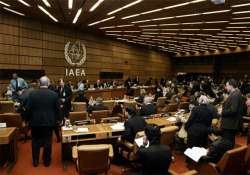IAEA experts to begin review of nuclear plants in Rajasthan tomorrow
New Delhi, Oct 28,2012: Global nuclear watchdog IAEA will begin on Tuesday an in-depth operational safety review of two atomic power plants at Rawatbhata in Rajasthan, the first such exercise in India after the Fukushima

New Delhi, Oct 28,2012: Global nuclear watchdog IAEA will begin on Tuesday an in-depth operational safety review of two atomic power plants at Rawatbhata in Rajasthan, the first such exercise in India after the Fukushima nuclear accident.
The Operational Safety Review Team (OSART) of the International Atomic Energy Agency will review programs and activities essential to operational safety at units 3 and 4 of the Rajasthan Atomic Power Station (RAPS) between tomorrow and November 15.
“Basically, it is a peer review of safety status and operating practices done by a team of experts for the IAEA,” S S Bajaj, Chairman, Atomic Energy Regulatory Board (AERB) told here.
He said all nuclear plants had undergone a peer review earlier by international experts of the World Association of Nuclear Operators (WANO), but it is for the first time any nuclear plant is being subject to the OSART process.
Atomic Energy Commission Chairman Ratan Kumar Sinha said the OSART process would give the nuclear operator insight into its operational process.
“Both OSART and WANO are independent external reviews. It is more of a confidence-building exercise as experts of 10 different nations are involved in the review process,” he said.
Sinha said the outcome of the WANO review is confidential, but the findings of the OSART process are in the public domain.
Bajaj said a decision on inviting OSART experts to other nuclear power plants would be taken after studying the outcome of the process carried out at RAPS.
The OSART mission is not a regulatory inspection or a substitute for an exhaustive assessment of the plant's overall safety status, officials said.
It is an in-depth review of those aspects, largely under the control of site management, which are essential to the safe operation of a nuclear power plant.
The government is also planning to invite the IAEA's Integrated Regulatory Review Service (IRRS) for a peer review of India's nuclear regulatory system.
The IRRS involves comparing national regulatory framework against regulatory safety standards and nuclear security guidance documents developed by the IAEA, as well as against international legal instruments.
Prime Minister Manmohan Singh had directed the Department of Atomic Energy to subject nuclear plants in the country to the OSART process to assist in its own safety reviews and audits of nuclear power plants.
This decision was taken at a meeting chaired by Singh in April last year to review safety concerns about nuclear plants across the country in the wake of the nuclear accident at Fukushima in Japan.
Three atomic power plants experienced a full meltdown following loss of power due to a massive earthquake and a subsequent tsunami at Fukushima on March 11 last year.
The Operational Safety Review Team (OSART) of the International Atomic Energy Agency will review programs and activities essential to operational safety at units 3 and 4 of the Rajasthan Atomic Power Station (RAPS) between tomorrow and November 15.
“Basically, it is a peer review of safety status and operating practices done by a team of experts for the IAEA,” S S Bajaj, Chairman, Atomic Energy Regulatory Board (AERB) told here.
He said all nuclear plants had undergone a peer review earlier by international experts of the World Association of Nuclear Operators (WANO), but it is for the first time any nuclear plant is being subject to the OSART process.
Atomic Energy Commission Chairman Ratan Kumar Sinha said the OSART process would give the nuclear operator insight into its operational process.
“Both OSART and WANO are independent external reviews. It is more of a confidence-building exercise as experts of 10 different nations are involved in the review process,” he said.
Sinha said the outcome of the WANO review is confidential, but the findings of the OSART process are in the public domain.
Bajaj said a decision on inviting OSART experts to other nuclear power plants would be taken after studying the outcome of the process carried out at RAPS.
The OSART mission is not a regulatory inspection or a substitute for an exhaustive assessment of the plant's overall safety status, officials said.
It is an in-depth review of those aspects, largely under the control of site management, which are essential to the safe operation of a nuclear power plant.
The government is also planning to invite the IAEA's Integrated Regulatory Review Service (IRRS) for a peer review of India's nuclear regulatory system.
The IRRS involves comparing national regulatory framework against regulatory safety standards and nuclear security guidance documents developed by the IAEA, as well as against international legal instruments.
Prime Minister Manmohan Singh had directed the Department of Atomic Energy to subject nuclear plants in the country to the OSART process to assist in its own safety reviews and audits of nuclear power plants.
This decision was taken at a meeting chaired by Singh in April last year to review safety concerns about nuclear plants across the country in the wake of the nuclear accident at Fukushima in Japan.
Three atomic power plants experienced a full meltdown following loss of power due to a massive earthquake and a subsequent tsunami at Fukushima on March 11 last year.